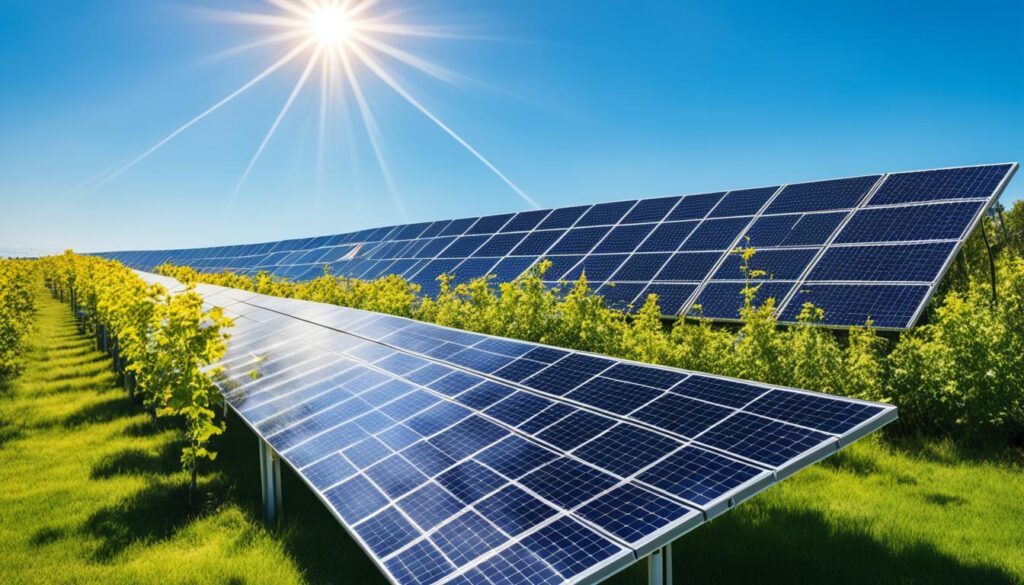As we learn more about climate change and protecting our planet, talking about renewable energy is key. Solar power is a top choice for clean energy. But, does solar energy really last forever? This guide will explore this question and talk about sustainable energy in general. Solar power helps lower our energy costs and cuts down on carbon emissions. It’s a big step in fighting global warming.
Key Takeaways
- Solar power is a widely discussed form of sustainable energy.
- The renewability of solar energy plays a significant role in reducing carbon emissions.
- Using solar energy can lead to considerable savings on electricity bills.
- Solar power is crucial for achieving energy independence.
- Global interest in renewable energy underscores its future importance.
Understanding Renewable Energy
Renewable energy is key in our move to sustainable living. It’s important to know the difference between it and non-renewable sources. Non-renewable sources are limited and can harm the environment.
What is Renewable Energy?
Renewable energy comes from nature, like sunlight, wind, rain, and heat from the Earth. These sources are endless and plentiful. They offer a great way to ensure energy for the future.
Types of Renewable Energy Sources
There are many kinds of renewable energy sources. They include various technologies and natural events:
- Solar Energy: Uses sunlight to make electricity.
- Wind Energy: Turns wind into electricity with turbines.
- Hydropower: Uses water flow to generate electricity.
- Geothermal Energy: Harnesses heat from under the Earth for power.
- Biomass: Burns organic stuff to make energy.
Solar energy is especially important because it’s everywhere and technology is getting better fast.

Why Renewable Energy is Important
Renewable energy is crucial for many reasons:
- Environmental Benefits: Switching to clean energy cuts down on carbon emissions. This helps fight climate change.
- Energy Security: Renewable energy can lessen our need for oil and gas from other countries. This makes us more independent.
- Economic Growth: The renewable energy field could create jobs and boost the economy.
Clean energy has many benefits. It improves the environment, helps the economy, and supports communities worldwide.
How Solar Energy Works?
Understanding solar energy is key to seeing its value in green energy. This part explains the basics, parts, and perks of using solar power.
Basics of Solar Power
Solar power turns sunlight into electricity. Solar panels have PV cells that catch sunlight and change it into DC electricity. This change is called the photovoltaic effect. It’s the main way solar power is made.
Components of a Solar Power System
A solar power system has key parts. These are:
- Solar Panels: They catch solar energy.
- Inverters: These change DC electricity from solar panels into AC electricity for homes and businesses.
- Batteries: They store extra energy for when it’s not sunny or at night.
- Mounting Systems: These hold solar panels in place.
These parts work together to give us a steady source of green energy.
Advantages of Solar Panels
Solar panels have many benefits for green energy. These include:
- Efficiency: Today’s solar panels can turn a lot of sunlight into electricity.
- Cost-Savings: Even though they cost a lot at first, they save money on bills and might get government help.
- Low Maintenance: Solar panels need very little upkeep and last more than 25 years, giving you long-term benefits with little work.
- Environmental Benefits: Using solar panels cuts down on greenhouse gases, making the air cleaner and healthier.
These points show why solar panels and other solar power system components are important for moving to sustainable energy.
Is Solar Energy Renewable?
Let’s dive into the question of whether solar energy is renewable. First, we need to define what solar energy is and look at its key features.
Defining Solar Energy
Solar energy comes from the sun’s rays and can be turned into heat or electricity. It uses special materials to catch sunlight and make electricity. Solar panels are key in capturing this energy well.
The Renewable Nature of Solar Power
Solar energy renewable because the sun never runs out. Unlike fossil fuels, which do, the sun’s energy is endless. This means solar power can meet our energy needs for a long time without running out.
Environmental Benefits of Solar Energy
Solar energy is great for the planet. Using it means we use less fossil fuel, which cuts down on harmful gases. This helps fight climate change and makes the air cleaner.
The table below shows how solar energy is better than fossil fuels for the environment:
| Criteria | Solar Energy | Fossil Fuels |
|---|---|---|
| Carbon Emissions | Minimal | High |
| Resource Depletion | Inexhaustible | Finite |
| Pollution | Negligible | Significant |
Solar Energy’s Role in Energy Independence
Switching to solar power helps countries be more independent. It lets them use their own energy sources instead of relying on others. This makes them less dependent on other countries and more secure in their energy needs.
Investing in solar energy also helps the economy. It saves money on imports and boosts local industries. This makes a country more stable financially.
Conclusion
Solar energy is a key to a cleaner and greener future. It comes from the sun, which is always there. This means we can use it without running out.
Using solar power helps the planet by cutting down on harmful gases and lessening our need for fossil fuels. We’ve learned a lot about how solar energy works and its benefits.
Solar energy is easy to use and efficient. New tech in solar panels brings more benefits, helping us meet global goals for a sustainable planet. By using solar tech, we help our planet and secure a bright future for our kids.
Switching to solar power is vital for our planet’s energy use. Solar energy can meet our energy needs now and in the future while protecting our environment. It’s important to support this clean energy source.
As we move forward, solar energy brings economic and environmental gains. It shows us a way to live sustainably and resiliently. Choosing clean energy means a better, greener, and sustainable future for everyone.
FAQ
What is renewable energy?
Renewable energy comes from sources that can be replenished easily and won’t run out, like the sun, wind, and water. These sources are different from fossil fuels, which get used up and can’t be replaced.
What are the types of renewable energy sources?
The main types of renewable energy are solar, wind, hydro, biomass, and geothermal. Each type uses natural processes to make energy. This offers a green alternative to fossil fuels.
Why is renewable energy important?
Renewable energy is key because it cuts down on pollution and helps fight climate change. It’s a sustainable way to meet our energy needs. It also lessens our reliance on dirty fossil fuels and boosts energy independence.
How does solar energy work?
Solar energy captures sunlight with solar panels. These panels turn sunlight into electricity using photovoltaic cells. This electricity can power homes, businesses, and more.
What are the components of a solar power system?
A solar power system has solar panels, an inverter, and sometimes batteries. The panels make electricity from sunlight. The inverter changes this electricity to use in our homes. Batteries store extra energy for later.
What are the advantages of solar panels?
Solar panels save money on electricity bills and have low upkeep costs. They also cut down on harmful emissions and increase energy freedom. Plus, they help lower our carbon footprint, making them a green choice.
Is solar energy renewable?
Yes, solar energy is renewable. It uses the sun, which has plenty of energy to give. As long as the sun shines, we can keep using its power, making it a steady and green energy source.
What are the environmental benefits of solar energy?
Solar energy is good for the planet because it lowers harmful emissions and pollution. It also uses less natural resources. Since it doesn’t burn fossil fuels, it’s better for the environment.
How does solar energy contribute to energy independence?
Solar energy helps us be less dependent on foreign fuels and makes our energy sources more varied. Countries that use solar power can rely less on energy from other countries. This makes their energy supply more secure and self-sufficient.

